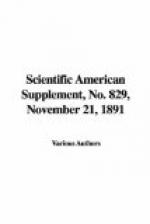Let us, even in the prime of manhood, disturb the distribution of force ever so little, and straightway our life, which is the resultant of force, is disturbed. If we use the active force too long, we become exhausted, and call on the reserve; if we continue the process, the result is failure more or less perfect, sleep, and, in the end, the last long sleep. Let us, instead of exhausting the force, cut it off at the sources where it is generated; let us remove the carbon or coal that should go in as fuel food, and we create prostration, and in continuance a waning animal fire, sleep, and death; or let us, instead of removing or withdrawing the supply of fuel, cut off the supply of air, as by immersion of the body in water, or by making it breathe a vapor that weakens the combination of oxygen with carbon—such a vapor as chloroform—and again we produce, at once, prostration, sleep, or death, according to the extent to which we have conducted the process. Lastly, if instead of using up unduly the active and reserve force, or of suppressing the evolution of force by the withdrawal of its sources, we expose the body to such an external temperature that it is robbed of its heat faster than it can generate it; if to supply the waste heat we draw upon the active and reserve forces, we call forth immediately the same condition as would follow extreme over-exertion, or suppression of the development of force; we call forth exhaustion and sleep, and, if we go far enough, death.




